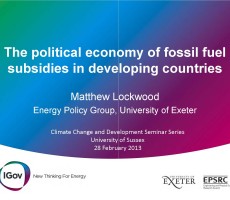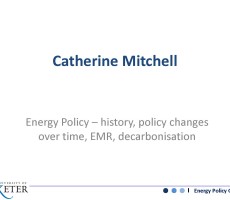-
New Thinking Blog: Something stirring down on the farm

Something stirring down on the farm Matthew Lockwood, IGov Team, 18th March 2013 About Matthew: http://geography.exeter.ac.uk/staff/index.php?web_id=Matthew_Lockwood Twitter: https://twitter.com/climatepolitics Out of sight of the mass of people living in towns and cities, a quiet revolution is underway in the British countryside as more and more farmers are investing in renewable energy. According to the National Farmers Union, one in five of its members had produced clean electricity from solar or wind by the end of 2012. Between 2011 and 2012 there was a 28% increase in the number of biogas plants, capable of providing both renewable electricity
Read More » -
New Thinking Blog: The New Energy System is Winning the Fight for the Future

The New Energy System is Winning the Fight for the Future Catherine Mitchell, IGov Team, 11th March 2013 About Catherine: http://geography.exeter.ac.uk/staff/index.php?web_id=Catherine_Mitchell Twitter: https://twitter.com/exeterepg In the middle of 2011, Germany announced its new energy policy: the energiewende or energy transformation. This is a 40 year programme with aspirational targets along the way including for renewable energy to provide 35% of electricity and 18% of energy by 2020 rising to greater than 80% of electricity and 60% of energy by 2050; with total energy demand to be cut by 50% by 2050; total carbon emissions to be cut
Read More » -
Call for Papers: Sustainable Supply Chains and Energy Security

Sustainable Supply Chains and Energy Security (Applied Energy) Guest editors: Prof Catherine Mitchell, Richard Hoggett, Dr Chiara Candelise, Dr Ronan Bolton, Dr Florian Kern Managing Editor: Prof. Jinyue Yan, Editor-in-Chief, Applied Energy Objective: This special issue in Applied Energy will focus on the links between energy security and the supply chains/value chains that make up energy systems. At a macro level, energy systems can be viewed as a supply chain, comprising of multiple and interrelated sub-chains based around different fuels, technologies, infrastructures, and actors. These enable resources to be extracted, transformed and distributed to meet the demand for
Read More » -
Presentation: Consumer Perspectives on the Future of the UK Gas Network

Presentation: The Future of the UK Gas Network – A Consumer Perspective From: Richard Hoggett To: UKERC Meeting Place – The Future of the UK Gas Network, March 2013 Download Consumer Perspectives on the Future of Gas Networks – Hoggett
Read More » -
Presentation: political economy of fossil fuel subsidies in developing countries

Presentation: The Political Economy of Fossil Fuel Subsidies in Developing Countries From: Matthew Lockwood To: Cliamte Change and Development Seminar Series, University of Sussex, Feb 2013 Download – ML Presentation on political economy of fossil fuel subsidies
Read More » -
New Thinking Blog: Fudging the future – why we need a 2030 decarbonisation target

Fudging the future – political divisions over a 2030 decarbonisation target are threatening the economy, energy security, bills and climate change. Richard Hoggett, IGov Team, 27th February 2013 About Richard: http://projects.exeter.ac.uk/igov/people/igov-team/richard-hoggett/ Twitter: https://twitter.com/HoggettRD The last few weeks have seen growing evidence from a broad range of organisations and commentators on the need for the Energy Bill to include a 2030 decarbonisation target (as well as the inevitable counter arguments in much of the media, and political circles). The problem is there is no simple route for developing a secure, affordable, low carbon energy system. Regardless
Read More » -
Talk by Catherine Mitchell on Energy Policy to BIS 26 Feb 2013

Presentation: Energy Policy From: Prof Catherine Mitchell To: BIS, Feb 2013 CM BIS presentation 26-2-
Read More » -
Catherine Mitchell Comment – Daily Mirror 20/2/13
Read More » -
New Thinking Blog: Is the Green Deal a Good Deal?

Is the Green Deal a Good Deal? Tom Steward, IGov Team, 18th Feb 2013 About Tom: http://projects.exeter.ac.uk/igov/people/igov-team/tom-steward/ Twitter: https://twitter.com/Steward_T It’s been a long time coming, but the end of January finally saw the Green Deal open for business. This is the coalition’s flagship policy designed to reduce energy demand by addressing Great Britain’s notoriously leaky (thermally speaking) housing stock. People are offered the opportunity to improve the efficiency of their homes at next to no upfront cost, by means of a loan which is repaid through electricity bills. Uniquely, the loan is attached to the
Read More » -
New Thinking Blog: Four Subjectivities of Nuclear Energy

Four Subjectivities of Nuclear Energy Caroline Kuzemko, IGov Team, February 11th 2013 For such an advanced technology decisions about whether to include nuclear power in the electricity generation mix are highly subjective, and subject to no small amount of flip-flopping. Exploring and understanding what these subjectivities are, and how they relate to energy policy objectives, is vital if we are to get to the bottom of political decision making regarding nuclear power. We might first explain these subjectivities with reference to the observation that aspects of nuclear power are difficult to quantify. Historically nuclear power
Read More »






